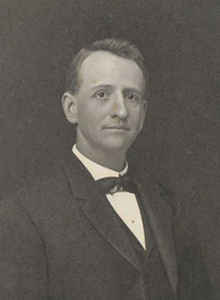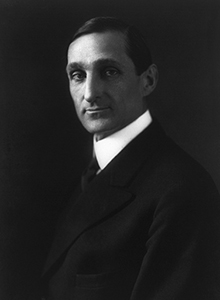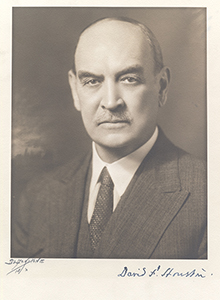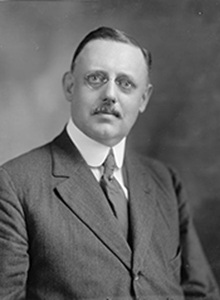
Carter Glass
- Ex Officio Chairman, Federal Reserve Board, 1918 – 1920
- Born: January 4, 1858
- Died: May 28, 1946
As a member of the U.S. House of Representatives, Carter Glass co-sponsored the Federal Reserve Act. As secretary of the Treasury from 1918 to 1920, he also served as ex officio chairman of the Federal Reserve Board. Later, as U.S. senator and chairman of the Senate Banking Committee during the Great Depression, Glass co-sponsored major legislation that changed the structure and responsibilities of the Federal Reserve System.
Carter Glass was born in 1858 in Lynchburg, Virginia. Glass’s early career was spent in the newspaper business, where he rose from reporter to editor to publisher and, finally, to owner of the Lynchburg Daily News and the Daily Republican.
Glass entered government service in 1881 as Lynchburg city clerk. He participated actively in local, state, and national politics and used his position as an editor and publisher to endorse political candidates and support racial segregation.1 Glass served in the Virginia state senate from 1899 to 1902.2 He was also a delegate to the Virginia constitutional convention of 1901-02, where he championed a rewriting of the state constitution to disenfranchise the state's Black citizens.3*
Glass was elected to Congress in 1902, representing Virginia's sixth District, after having been appointed to fill a vacant seat earlier in the year.4 He was appointed to the House Banking and Currency Committee, where he took an active interest in banking and economics. Glass was appointed chairman of the committee in 1913 and worked with Senator Robert Owen (D-OK) and President Woodrow Wilson to pass the Federal Reserve Act. Glass advocated for a regionally decentralized central banking system with mixed public and private control, a concept that is reflected in the System’s structure to this day.
In 1918, President Wilson appointed Glass to lead the Treasury Department, succeeding William McAdoo. As secretary of the Treasury, Glass was ex officio chairman of the Federal Reserve Board. In his brief tenure Glass favored the use of qualitative measures rather than interest rates to control the growth of credit.5
In early 1920, Glass was appointed to the U.S. Senate to fill an unexpired term. He remained in the Senate until his death in 1946. As senator, Glass lent his name and influence to notable legislation, including the Banking Act of 1932, the Banking Act of 1933 (commonly called the Glass-Steagall Act), and the Banking Act of 1935. These acts restructured the Federal Reserve System by forming the Federal Open Market Committee (the Federal Reserve’s chief monetary policymaking body) and giving new authority to the Federal Reserve’s Board of Governors (which replaced the Federal Reserve Board). Among other things, the acts also separated commercial and investment banking and created the Federal Deposit Insurance Corporation.
Glass died on May 28, 1946.
* To our readers: This website provides information about individuals who played important roles in Federal Reserve history, some of whom embraced, advocated, or advanced public policies that are wholly inconsistent with our values. This profile and others on this website acknowledge these problematic views and actions. The Federal Reserve History website is committed to transparency in documenting the stories that Fed history reveals and doing so in a manner that is consistent with the Federal Reserve’s commitment to education, diversity, equity, and inclusion.
Written by the Federal Reserve Bank of Richmond in 2013 and updated by Genevieve Podleski and David C. Wheelock, September 13, 2021. See disclaimer and update policy.
Endnotes
- 1 Fink, Matthew. The Unlikely Reformer: Carter Glass and Financial Regulation. George Mason University Press, 2019.
- 2 "Glass, Carter," Biographical Directory of the United States Congress, n.d.
- 3 "Constitutional Convention, Virginia (1901-1902)," Encyclopedia Virginia, n.d. and Wilson, Harold. “The Role of Carter Glass in the Disfranchisement of the Virginia Negro.” The Historian 32, no. 1 (1969): 69–82. See also White, Eugene. "Carter Glass." The Encyclopedia of American Business History and Biography. Facts on File, 1990: 160; and Lowenstein, Roger. America’s Bank: The Epic Struggle to Create the Federal Reserve. Penguin Press, 2015: 153.
- 4 "Glass, Carter (1858-1946)," Encyclopedia Virginia, n.d.
- 5 Meltzer, Allan H. A History of the Federal Reserve, Volume 1. University of Chicago Press, 2010: 92, 96.




 X
X  facebook
facebook
 email
email